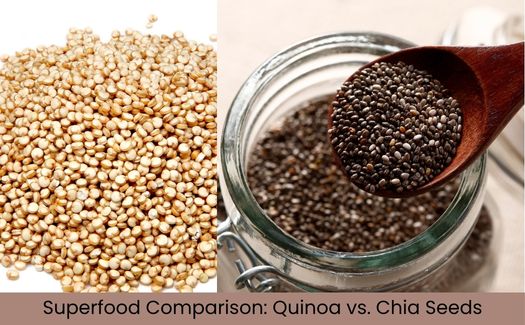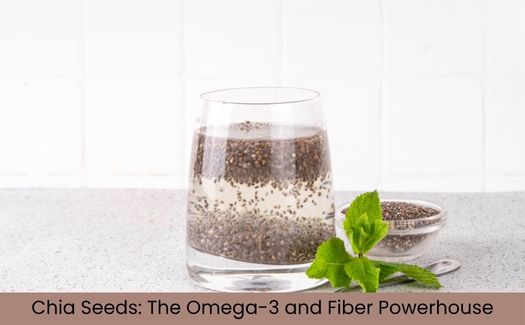Objective
The objective of this article is to compare Quinoa Seeds and Chia Seeds, two of the most popular superfoods in the health and wellness community. By comparing their nutritional profiles, health benefits, and culinary uses, this guide will help readers understand which seed better suits their dietary needs, lifestyle, and nutritional goals.
Introduction
In recent years, quinoa seeds and chia seeds have earned their place as superfoods, revered for their impressive nutritional profiles and versatility in the kitchen. These seeds are packed with protein, fiber, and healthy fats, making them popular choices for health-conscious individuals looking to enhance their diet and boost overall wellness.
However, despite their similarities, quinoa and chia seeds have distinct qualities that may make one more suited to specific dietary needs or preferences. In this article, we’ll dive deep into the nutritional value and health benefits of each seed, providing a clear comparison to help you decide which one fits your lifestyle best.
Nutritional Comparison – Quinoa Seeds vs. Chia Seeds
Quinoa Seeds – A Complete Plant Protein
Nutritional Overview:
Quinoa, often referred to as a “pseudo-grain”, is actually a seed. It is one of the few plant-based sources of complete protein, meaning it contains all nine essential amino acids that the body cannot produce on its own. In addition to protein, quinoa is a rich source of fiber, magnesium, iron, and B-vitamins.
- Calories (per 100g): 368
- Protein: 14g
- Carbohydrates: 64g
- Fiber: 7g
- Fat: 6g
- Minerals: Magnesium, iron, calcium, phosphorus
Chia Seeds – Packed with Omega-3s and Fiber
Nutritional Overview:
Chia seeds are a highly nutritious seed, primarily known for their omega-3 fatty acids, particularly alpha-linolenic acid (ALA). They are also a great source of fiber, antioxidants, and calcium, with significant energy-boosting properties.
- Calories (per 100g): 486
- Protein: 17g
- Carbohydrates: 42g
- Fiber: 34g
- Fat: 30g
- Minerals: Calcium, phosphorus, magnesium, manganese

Health Benefits – Quinoa Seeds vs. Chia Seeds
Quinoa Seeds – A Comprehensive Health Support
Health Benefits:
- High in Protein: Quinoa provides complete plant-based protein, making it ideal for vegetarians and vegans looking to meet their protein needs.
- Rich in Fiber: Supports digestive health and helps regulate blood sugar levels.
- Rich in Antioxidants: Contains a variety of antioxidants, including flavonoids, which are known for their anti-inflammatory properties.
- Gluten-Free: Suitable for individuals with gluten sensitivity or those following a gluten-free diet.
- Mineral Boost: Contains important minerals like magnesium and iron, which support bone health and oxygen transport.
Chia Seeds – The Omega-3 and Fiber Champion

Health Benefits:
- Omega-3 Fatty Acids: High in ALA (Alpha-Linolenic Acid), an essential omega-3 fatty acid that supports heart health and brain function.
- High in Fiber: Chia seeds are one of the best sources of fiber, which helps improve digestion, weight management, and blood sugar control.
- Bone Health: Rich in calcium, which supports bone strength and density.
- Hydration Benefits: Chia seeds can absorb up to 10-12 times their weight in water, helping with hydration and digestion.
- Antioxidants: Packed with antioxidants that protect the body from oxidative stress.
Culinary Uses – Quinoa Seeds vs. Chia Seeds
Quinoa Seeds – Versatile and Nutritious
Quinoa is incredibly versatile and can be used in both savory and sweet dishes. Its mild, nutty flavor makes it suitable for salads, grain bowls, soups, and vegan burgers.
- Cooked Quinoa: As a grain alternative, quinoa can be boiled and used in place of rice or couscous.
- In Smoothies: It can be ground into a fine powder and added to smoothies for a protein and nutrient boost.
- As a Breakfast Cereal: Quinoa can be cooked like oatmeal and topped with fruits, nuts, and seeds for a nutritious breakfast.
Chia Seeds – A Nutrient-Packed Addition to Recipes
Chia seeds are small but highly potent in their nutritional benefits. They can be used whole or ground, and their gel-like texture when soaked makes them a popular ingredient in both sweet and savory dishes.
- Chia Pudding: Mix chia seeds with almond milk or coconut milk and refrigerate overnight to create a creamy chia pudding.
- As a Topping: Sprinkle chia seeds on smoothies, yogurt, oatmeal, or salads for added fiber and omega-3s.
- In Baking: Use ground chia seeds as a substitute for eggs in vegan baking recipes or as a thickener in sauces and soups.
Which Seed Fits Your Lifestyle and Diet?
Quinoa Seeds – Best for Those Seeking Protein and Fiber
- Ideal for: Vegetarians, vegans, and those looking for a complete plant protein source.
- Best used for: Meal base, grain alternative, or gluten-free dishes.
- Key Advantage: Rich in protein and essential minerals, making it a powerhouse for muscle repair, bone health, and energy.
Chia Seeds – Best for Those Seeking Omega-3s, Fiber, and Hydration
- Ideal for: Those seeking a high-fiber, omega-3-rich addition to their diet, especially individuals looking to improve digestion and heart health.
- Best used for: Puddings, smoothies, snacks, and vegan baking.
- Key Advantage: High in fiber and omega-3s, making them ideal for weight management, digestive health, and overall wellness.
Conclusion – Choosing Between Quinoa and Chia Seeds
Both quinoa and chia seeds offer an array of nutritional benefits that can enhance your overall health. The choice between the two depends on your specific health goals and dietary preferences:
- If you are looking for a complete protein source and a gluten-free grain alternative, quinoa may be the better choice.
- If you need extra fiber, omega-3 fatty acids, and a hydration boost, chia seeds will serve you well.
Both seeds can be easily incorporated into your daily meals and provide natural, plant-based nutrition to fuel your body with essential nutrients.
FAQs About Quinoa Seeds & Chia Seeds
Which seed has more protein, quinoa or chia?
Quinoa seeds contain slightly more protein per serving (14g per 100g) compared to chia seeds (17g per 100g), but quinoa is a complete protein with all nine essential amino acids.
Can I substitute quinoa for chia seeds in recipes?
While both are versatile, quinoa serves as a grain substitute and chia seeds are better suited for puddings and thickening. You can’t directly replace one with the other in all recipes.
Are chia seeds safe to eat every day?
Yes, chia seeds are generally safe when consumed in moderation (1-2 tablespoons per day). Overconsumption may cause digestive discomfort due to their high fiber content.
How do quinoa and chia seeds compare in terms of omega-3s?
Chia seeds are significantly higher in omega-3s (30g per 100g) compared to quinoa, which contains only a small amount of omega-3s.
Which seed is better for weight loss?
Both quinoa and chia seeds support weight management; chia seeds are particularly beneficial due to their high fiber content, which helps with satiety and digestion.

